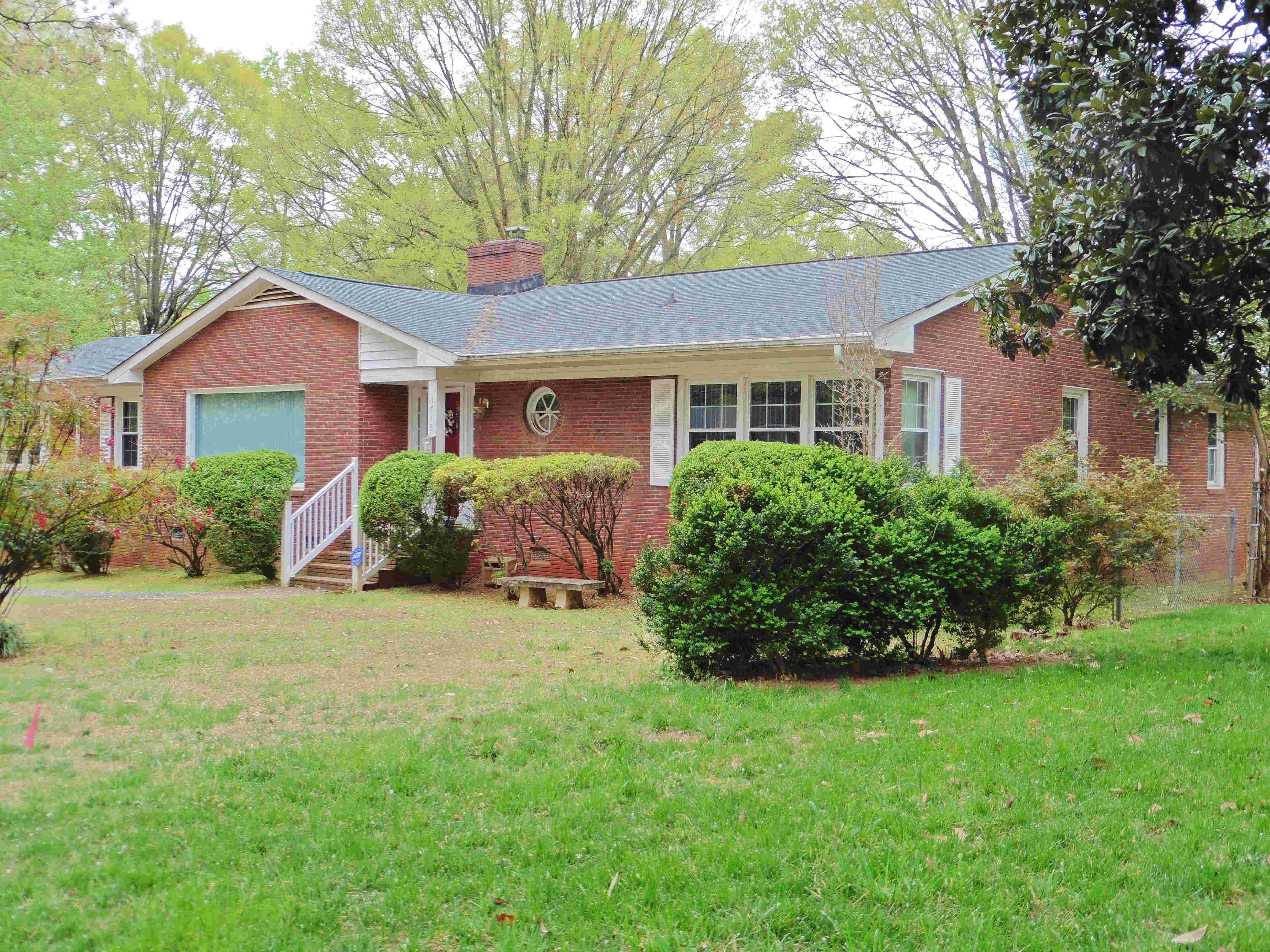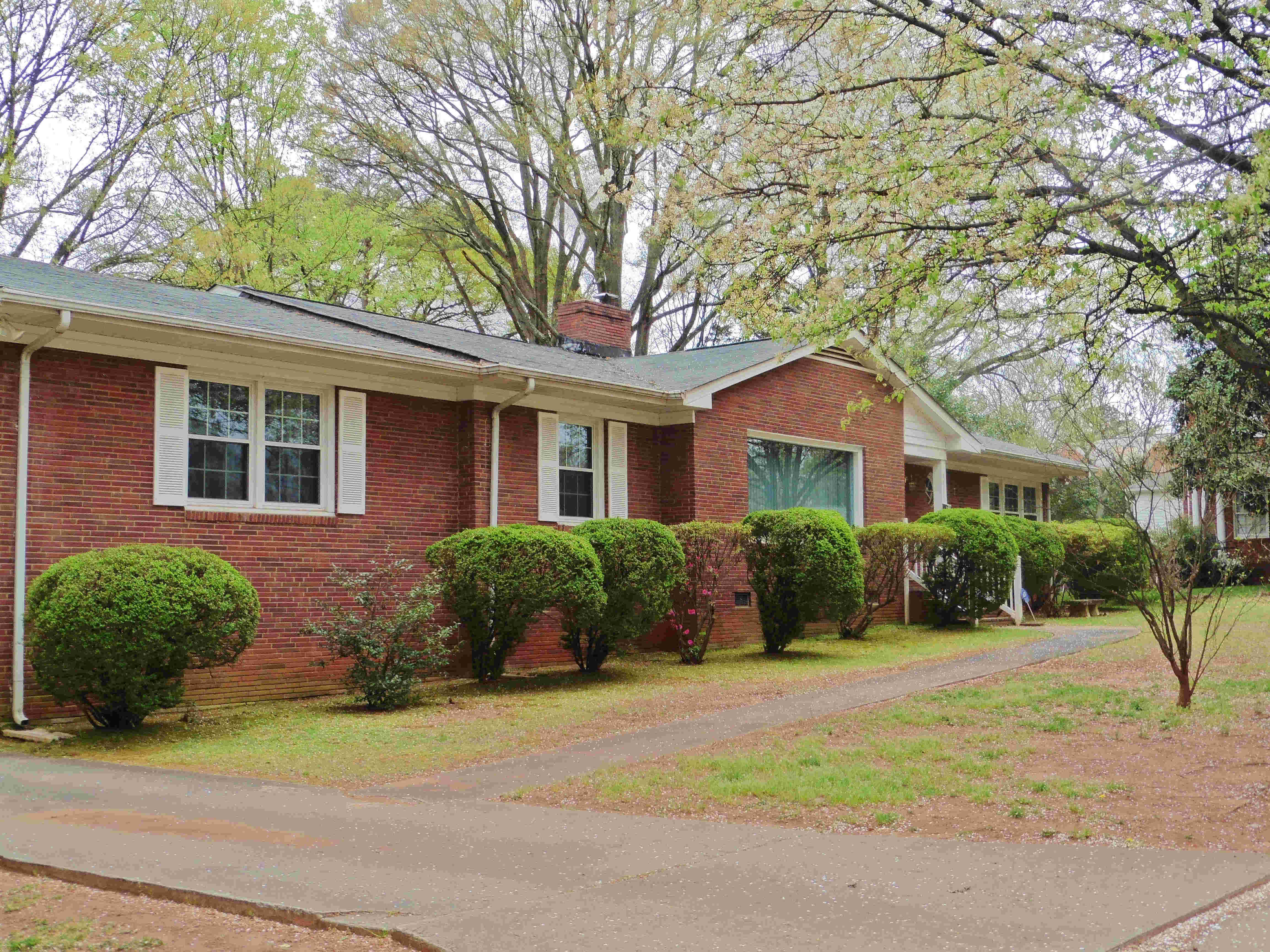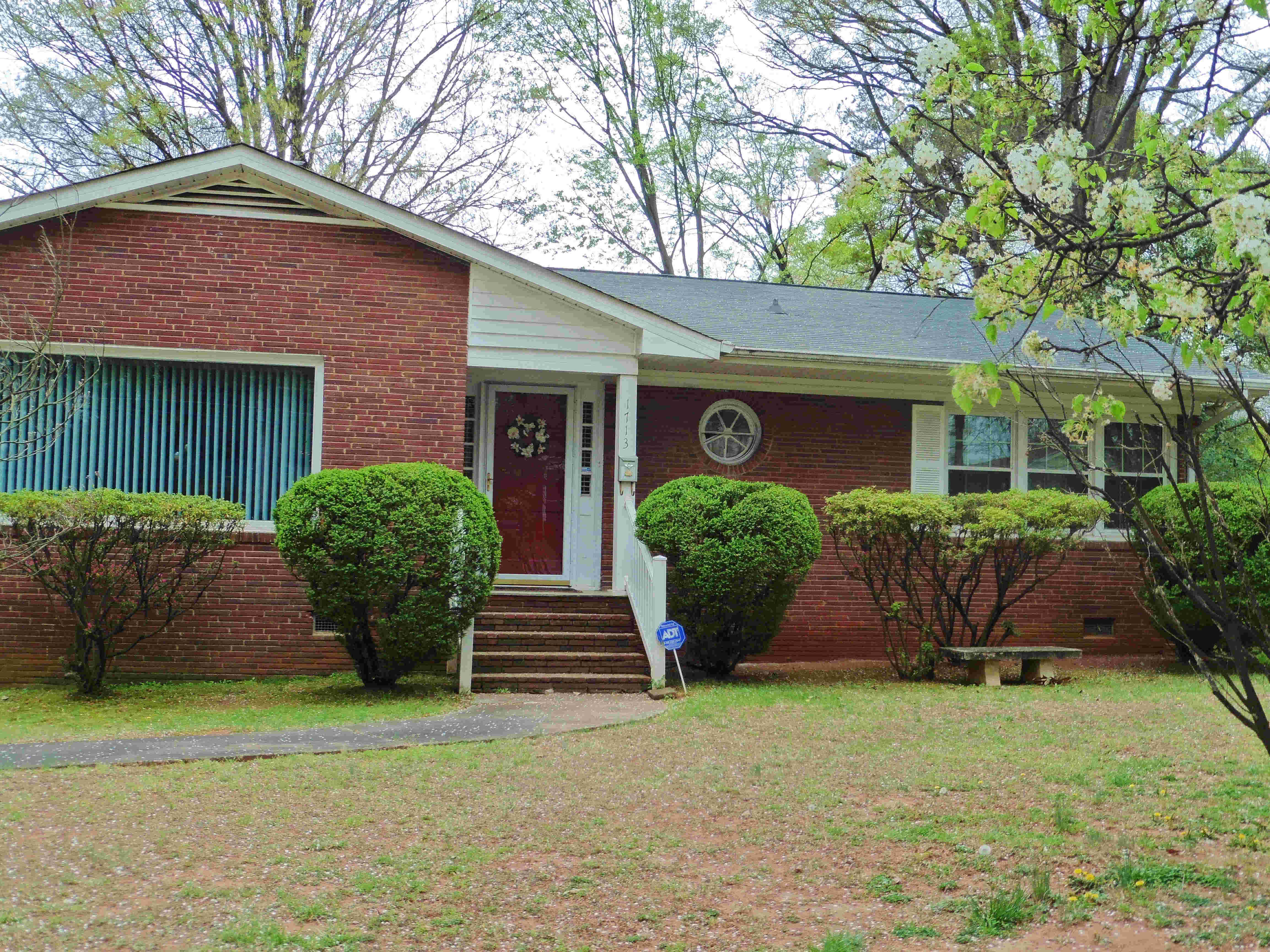1713 Oaklawn Avenue
 Built 1959-60 for Dr. Rudolph M. Wyche, one of Charlotte’s most distinguish physicians, and his wife Carolyne, a nurse. Dr. Wyche (no relation to attorney Thomas Wyche down the street) played an active role in civic affairs. He was part of the plaintiff group that won the 1951 lawsuit that desegregated Revolution Park, and in the mid 1950s he served as president of the black Old North State Medical Association as its members worked to end segregation in health care.
Built 1959-60 for Dr. Rudolph M. Wyche, one of Charlotte’s most distinguish physicians, and his wife Carolyne, a nurse. Dr. Wyche (no relation to attorney Thomas Wyche down the street) played an active role in civic affairs. He was part of the plaintiff group that won the 1951 lawsuit that desegregated Revolution Park, and in the mid 1950s he served as president of the black Old North State Medical Association as its members worked to end segregation in health care.
***
Rudolph Melville Wyche (5.15.1900 – 9.?.1973) was a second generation African American physician, following his father Allen A. Wyche who had started practice here in the 1890s. Rudolph did his undergraduate work at Johnson C. Smith, Class of ’24, where he was instrumental in starting the Charlotte chapter of the Omega fraternity: “The Rho Chapter of Omega was founded December 5, 1921 at Johnson C. Smith University by Rudolph Wyche and Dr. Arthur George.”
He also saw patients at his office in a professional building in Charlotte’s bustling Brooklyn neighborhood. His daughter Dianne Wyche recalled in an interview with UNC Charlotte student Tosha Pearson: “Dr. Watkins, Thomas Watkins, owned a medical building. And he had a pharmacy in it, and he had a number of doctors in the building. Dr. Lowe, who was a pediatrician, Dr. Wilkins, who was a medical doctor, and Dr. Watkins, Thomas Watkins and Thomas Watkins, Jr., were both in there. And they were dentists…. Alexander Funeral Home was right next door, the Queen City Pharmacy was down the street, the Lincoln Theater was in that area. That was all in between Second and Brevard Street.”
“I think a house call was only something like two dollars and sometimes they had it and sometimes they didn’t. And I know daddy probably did not charge a lot of people, or they said they would pay him later. I think an office visit must have been 3, 4 dollars, it wasn’t very much…I do know one person he … did surgery on him. Every spring and fall he used to bring us vegetables from his garden…He was very faithful for about five years. Every spring and every fall he brought us vegetables and potatoes and all kinds of stuff. Beans, so that was one way of paying. Sometimes with soup…so he’d have soup, he’d have meat, he’d have some of anything…Whatever people paid with, that’s what they paid for.
“He did all types of surgery; I mean he operated on everything. I met one lady who said ‘your daddy is the reason why I’m a mother today,’ and I’m like well wait a minute here. She said ‘No no no, I mean he operated on me, they told me I couldn’t have children’ and he did surgery on her. And I guess she had blocked tubes or something, I don’t know, but soon after the surgery she was pregnant. And he did a number of those. He was best known for his skills with mastectomies and breast cancer… most of his patients lived past their five years. A lot of other doctors would come from other hospitals…and they would have the younger doctors rotate through to watch and see the skills that he did with mastectomies.“
Both Dr. Wyche and his father were important leaders in efforts to organize black physicians and win equality. The senior Wyche started the Queen City Medical and Pharmaceutical Society (also known as the Charlotte Medical Society) in 1900. The younger Wyche became active in the statewide Old North State Medical Society at a critical juncture in the 1950s. In those days before the internet, medical societies with their regular meetings were an important way for doctors to exchange ideas and keep up with the latest science. White medical societies barred black physicians, a hindrance to the free flow of ideas — as well as being a calculated insult. But the harm went further. As pressure built for racial desegregation during the 1950s, North Carolina hospitals adopted a policy of only admitting physicians who belonged to the North Carolina Medical Society — which only accepted white members. Could African Americans win the end of hospital segregation? Of medical society segregation? Those were hot questions as Dr. Rudolph Wyche stepped into leadership of the black organization in 1954.
“Dr. Rudolph M. Wyche, a native of Charlotte and the new President-Elect of the Old North State Medical Society, was educated in the public schools of that city. He received his collegiate training at Biddle University which is now Johnson C. Smith University of Charlotte and took his medical training at the Howard University School of Medicine. Before entering the practice of medicine he did an Internship at the Lincoln Hospital in Durham, N. C. The new President-Elect is an active man in the medical profession as well as in the civic life of his community. He is a member of the St. Michaels and All Angels P. E. Church, a member of the Omega Psi Phi Fraternity, and is a veteran of World War I.” — Journal of the Old North State Medical Society, March 1954.
He also had solid Civil Rights credentials. In 1951 Dr. Wyche had signed on as one of the plaintiffs in the lawsuit that eventually desegregated Charlotte’s Revolution Park. “It is with great pride that we point to the activities of … Roy Wynn (another doctor/plaintiff who lived two doors up Oaklawn Avenue) and Rudolf Wyche of Charlotte,” applauded the Journal of the Old North State Medical Society. “These men have been instrumental in breaking down racial barriers that prohibited the use of Municipal Golf Courses by Negroes.” In May of 1954 Johnson C. Smith students proudly dedicated their yearbook to Dr. Wyche.
Rudolph Wyche’s time at the helm of the black medical society proved tumultuous. His colleagues expected him to push for full desegregation. But as a surgeon, he was painfully aware that lack of access to the best hospitals was harming patients every day. Should he attack that problem first — attempt to open hospitals to black doctors and patients, and wait until later to integrate the white medical society?
In June of 1954, an Associated Press story quoted him as saying, “There is not a doctor in our society who would want to take part in the social activities” of the white society.
It was precisely the wrong thing to say. White doctors budged not a bit in their determination to keep everything segregated. Black doctors erupted in anger. Dr. Wyche “had no authority to make such a statement,” the black Carolina Times newspaper quoted the Old North State’s executive committee as saying. Further, any proposed desegregation plan “would not be accepted unless all privileges are accorded.”
Eventually hospitals in Charlotte and across the state did desegregate. And the white medical society did accept black physicians. Interestingly, it would be a McCrorey Heights neighbor of Dr. Wyche — dentist Dr. Reginald Hawkins — who would help lead that successful campaign.
Dr. Wyche continued his Charlotte medical practice, retiring after nearly 30 years. When he passed away in 1973 at age 73, national Jet magazine ran a brief story, calling him a “noted Charlotte physician.”
***
Carolyne Welborne Wyche (6.17.1924 – 5.8.2010) came from her native Salisbury, N.C., to attend the nurses training program at Charlotte’s Good Samaritan Hospital, graduating in 1944. In addition to assisting her husband she worked as a nurse first at Good Samaritan then, after integration, at Charlotte Memorial Hospital. Later in her career she worked for Charlotte Mecklenburg Schools, finishing as a health occupations teacher at Independence High School.
Like most McCrorey Heights women, Mrs. Wyche had a busy social and civic life. She belonged to the Moles, which daughter Dianne described as “a social party club,… a group of friends who got together once a month and had dinner, and entertained.” Dianne contrasted the Moles with another group which her mother chose not to join: the Links. “The Links is more of a civic-type organization, where they raise money, they give money towards education and the arts, and, and to help children in school. So the Links have more, like sororities and fraternities, have more of a civic duty.”
Mrs. Wyche and daughter Dianne helped launch the local chapter of Jacks & Jills, the nationwide social organization for upscale African American youngsters. “A group of women from Raleigh came down and started the chapter in Charlotte,” Dianne recalled. “And I was in the first teen group. There were doctor’s wives, preacher’s children, professors from the school, from Smith, the president of Smith, and those things, but we were all in the teen group. Jack and Jill was a national organization so you got to travel and to meet people and that was kind of a middle class group, I guess. And it’s still in existence today, and does quite well.”



Architecture
Ranch. One-story red brick with main gable roof and projecting front gable over the living room picture window.
Building permit
Oaklawn-1713-permit
Date issued: May 21, 1959
Owner: Dr. R. M. Wyche
Contractor: E. O. Clarkson
Other permit info: to build residence
Building permit files, Robinson-Spangler Carolina Room, Charlotte Mecklenburg Library.
First appeared in city directory
1961 – Rudolph M. Wyche & Carolyn W.
He: Physician-Surgeon 2nd Floor Watkins Bldg 319 S. Brevard (see ad).
She: Nurse.
[Not related to attorney Thomas Wyche who lived 2 doors down at 1635 Oaklawn]
City directory collection, Robinson-Spangler Carolina Room, Charlotte Mecklenburg Library.
obituary
Martin, Ethel Wyche, funeral program in the History Room, First United Presbyterian Church, Charlotte.
Resources
“Final Rites Conducted for Noted Charlotte Physician,” Jet, November 22, 1973. On-line at: https://books.google.com/books?id=VbEDAAAAMBAJ&pg=PA14&lpg=PA14&dq=%22Final+Rites+Conducted+for+Noted+Charlotte+Physician,%22+Jet,&source=bl&ots=Ya9YLvXYOk&sig=CcAVdhtX9Cru6JYf68SCq6uep70&hl=en&sa=X&ved=0ahUKEwjCvvKsoYPTAhUF7iYKHccpCjUQ6AEIHDAA#v=onepage&q=%22Final%20Rites%20Conducted%20for%20Noted%20Charlotte%20Physician%2C%22%20Jet%2C&f=false
Kenzer, Robert C., Enterprising Southerners: Black Economic Success in North Carolina, 1865 – 1915 (), p. 114. On-line at: https://books.google.com/books?id=F9F_Tx47ZRYC&pg=PA114&lpg=PA114&dq=%22Queen+City+Medical%22+Kenzer&source=bl&ots=E74uxdMP_X&sig=sTIbgkneepfMH07axqhTDbDWYV0&hl=en&sa=X&ved=0ahUKEwj5ztLus4HTAhWDdSYKHZ_7D2UQ6AEIGjAA#v=onepage&q=%22Queen%20City%20Medical%22%20Kenzer&f=false
“Negro Doctors Oppose Bias Society,” Carolina Times, August 4, 1956.
Reynolds, P.Preston, “Professional and Hospital Discrimination and the U.S. Court of Appeals, Fourth Circuit, 1956 – 1767.” Journal of American Public Health, May 2004. On-line at: www.ncbi.nlm.nih.gov/pmc/articles/PMC1448322/
Wyche, Dianne, oral history by Tosha McLean Pearson, History Department, UNC Charlotte, April 28, 2007. Transcript on-line at: http://www.history.uncc.edu/publichistory/pages/oralhist/brooklyn/transcripts/wyche%20transcript_files1.htm